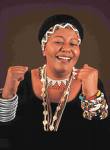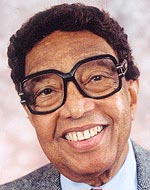 One of the pleasures of the 2007 Cape Town International Jazz Festival (read a review elsewhere on www.openskyjazz.com) was the special band drummer-composer-conceptualist Jack DeJohnette dubbed Intercontinental. This latest in DeJohnette’s seemingly endless well of special projects brought together musicians from four different continents: Jack and bassist Jerome Harris (U.S.), pianist Danilo Perez (Panama), saxophonist Jason Yarde and trumpeter Byron Wallen (U.K.), and most auspiciously the thrilling multi-octave South African vocalist Sibongile Khumalo (pron. See-Bon-Geelay Koo-mah-lo).
One of the pleasures of the 2007 Cape Town International Jazz Festival (read a review elsewhere on www.openskyjazz.com) was the special band drummer-composer-conceptualist Jack DeJohnette dubbed Intercontinental. This latest in DeJohnette’s seemingly endless well of special projects brought together musicians from four different continents: Jack and bassist Jerome Harris (U.S.), pianist Danilo Perez (Panama), saxophonist Jason Yarde and trumpeter Byron Wallen (U.K.), and most auspiciously the thrilling multi-octave South African vocalist Sibongile Khumalo (pron. See-Bon-Geelay Koo-mah-lo).
One of the more useful aspects of overseas jazz festivals is the daily artist press conferences which are all too rare at stateside festivals. The Intercontinental band’s press conference afforded Suzan Jenkins and me an opportunity to sit down with Ms. Khumalo for a conversation. Jazz in particular, and music in general in South Africa is as broad and rich as anyplace on the African continent.
Sibongile Khumalo is an extraordinarily versatile singer, as comfortable with Jack DeJohnette as she is in the role of Bizet’s Carmen or singing Brahms Alto Rhapsody. Her discography leaps comfortably between the supposed stylistic chasms that separate jazz and European classical music, and her artistry is deeply bred in the vocal and language folkloric traditions of South Africa . Its time the world woke up to the vocal force of nature known as Sibongile Khumalo. Among other things she shared some fascinating insights into the unique challenges South African artists face in making their work post-apartheid.
Willard Jenkins: The first time we came to Cape Town for the festival, in 2005, we heard a lot of exceptional South African instrumentalists, but I was curious about the vocal side. It was recommended that I had to get some of your recordings. At the CD Warehouse (now known as Musica) store on the Cape Town waterfront I found the jazz record you made at the Market Theatre, then subsequently I ordered one of your classical discs from Sterns music. Duke Ellington described Ella Fitzgerald as being “beyond category.†It’s obvious that you’re beyond category as well. Talk about the broadness of your approach to music.
Sibongile Khumalo: In 1991 I’d been doing concerts with a symphony orchestra, doing oratorios, doing recitals, but also working with a brilliant jazz guitarist who passed away a couple of years ago named Allen Kwela. Between Allen and another jazz vocalist who also passed away a year ago, I was exposed to jazz as a genre, as a potential for expression.
At some point people say ‘…and you have such a wonderful voice, whey don’t you record something…?’ I’d be like ‘what am I going to record; I just sing what I sing…’ At that stage, early in my career, I didn’t feel like I was singing anything that I felt was important simply because – maybe that’s not the right word – I wasn’t singing things that I had been taught to sing. I was singing “Messiah,†I was singing “Elijah,†some arias from operas here and there… But it was not something that I thought I could put down in a recording for posterity. I felt I needed to have a voice, some kind of language of my own, but I didn’t know what that was.
Pop music, South African pop music – the way that Yvonne Chaka Chaka, Brenda Fassi, Sipho Mabuse, and all those groups, was big as well; there was a whole circuit of festivals the same as you have jazz festivals at the moment. That also was not something that I felt I could quite speak to. So [her evolution towards jazz] kinda happened organically. I started drawing from those kinds of elements that I’d grown up with: choral music, some of the classical stuff, and I put together a show called “The 3 Faces of Sibongile Khumalo†in ’92. In that program there were elements of the classical world that I’d come from, elements of the jazz that Alan and Sophie Mqina had exposed me to, and some of the traditional stuff that I grew up with in the township [Soweto].
I did bits and pieces of all of that, just doing some Bach, some of the choral work, some scat, incorporating some of the stuff from the operas on top of the improvisations that the guys were doing. It was kind of happening like that. Over the years that has kind of evolved and developed slowly, gradually. Then I sort of fell back to my comfort zone again and I started doing some of the more sort of easy on the ears sort of things with the album before the classical one, called Quest, which was drawing on some of the old South African jazz standards without going into the whole sort of stretching out – just singing the music and having a good time with it.
That was until two years ago when I was challenged in a sense. Jack [DeJohnette] said ‘I’d like to work with her…’ I said ‘OK, Jack DeJohnette wants to work with me… OK, we’ll see about that.’ That was my attitude initially. A year ago I got this call ‘we’ve found an opportunity to get this thing going for you and Jack in March 2007 [Cape Town International Jazz Festival]. I said ‘March is fine, its cool, its OK…’ Three months ago I get this call from Jack DeJohnette and I said ‘alright, this is happening…’ I had to start thinking about this; the conversations happened and we shared the music, sending each other discs and songs. I started listening and I was thinking to myself, ‘I knew Jack DeJohnette was deep, but this is DEEP. How am I going to deal with this stuff?’
I’m told about Danilo Perez , I’m told about Jerome Harris… Jason [Yarde] I’d met and worked with in the U.K. a few times, Byron [Wallen] I was aware of but not too closely. So I’m thinking ‘OK…’ I talked to people here and told them Jack DeJohnette… this is really happening! So I was asked the question ‘well, who’s in the band?’ I said “the pianist is a guy called Danilo Perez , and Jerome Harris…†They said ‘who…?’ I said ‘ Danilo Perez …’ My son in particular… I told him I’d listened to [Danilo]’s music, he’s such a beautiful player…’ My son said ‘he’s a what…? Ma, do you hear yourself?’ I said Danilo sounds good, he’s very nice actually…’ My son said ‘Ma, he’s awesome… he’s an awesome musician… are you listening? I said ‘yeah, OK, he’s great, sure…’
So that’s how this journey has been to this point. My approach, coming back to that long-winded answer to your question, my approach is informed really by where I come from. It was all of that… What’s happening though with [Intercontinental] is that all of these things sometimes happen in a song. Before it was the classical element, it’s the choral, it’s the jazz bit, and it’s traditional… sometimes in the same song everything kind of comes together.
WJ: That kind of sums up Jack’s Intercontinental Project approach.
Continue reading →

 Billy Taylor was in DC as part of his ongoing curatorial efforts and guidance in all things jazz at the
Billy Taylor was in DC as part of his ongoing curatorial efforts and guidance in all things jazz at the  One of the pleasures of the 2007 Cape Town International Jazz Festival (read a review elsewhere on
One of the pleasures of the 2007 Cape Town International Jazz Festival (read a review elsewhere on